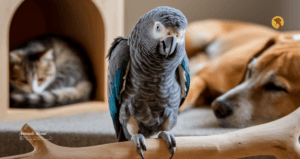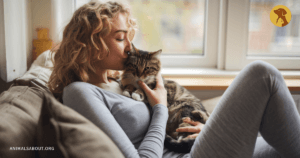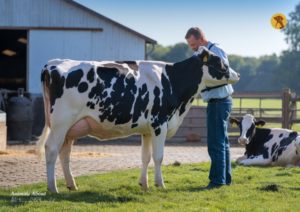As a devoted pet parent, nothing tugs at your heartstrings more than noticing your furry companion is losing weight suddenly. One moment, your dog is chasing their tail or your cat is lounging in their favorite sunspot, and the next, you’re running your hands over their ribs, feeling bones that weren’t so prominent before. A sudden weight drop in animals is not just a cosmetic issue it’s often a red flag for underlying health problems. For instance, allergies can sometimes lead to appetite loss or digestive issues. Learn how to handle pet allergies to rule out this potential cause and keep your four-legged friend on track to better health.
For animal lovers, understanding why your pet is losing weight suddenly and what to do about it is crucial for keeping your four-legged friend happy and healthy. In this comprehensive guide, we’ll dive into the common reasons for pet weight loss, key pet weight loss symptoms to watch for, and practical steps to address unexplained weight loss in cats or dogs.
Why Is My Pet Losing Weight Suddenly?
A pet losing weight suddenly can be caused by a variety of factors, from temporary issues like stress to serious health issues causing weight loss in pets. The key is to identify the cause early to ensure your pet gets the care they need. Below, we explore the most common veterinary causes of pet weight loss and what they might mean for your dog or cat.
1. Loss of Appetite or Change in Eating Habits
One of the most obvious reasons for a sudden weight drop in animals is a pet not eating or a change in pet appetite. This could be due to something as simple as disliking a new food brand or as complex as an underlying illness. Stress, such as a new pet in the household or a move, can also curb your pet’s appetite, leading to unexpected weight loss in pets. More concerning causes include digestive problems in pets or even cancer symptoms in pets.
- What to look for: Is your pet ignoring their food bowl, eating smaller portions, or showing lethargy in pets? Are they vomiting or showing signs of discomfort after meals?
- What to do: Try tempting them with their favorite treats or warming their food to enhance its aroma. If the pet not eating persists for more than a day or two, it’s time to visit the vet to rule out serious issues.
2. Dental Problems
Dental issues are a surprisingly common cause of unexplained weight loss in cats or dogs. Painful teeth, gum disease, or oral infections can make chewing uncomfortable, causing your pet to avoid food altogether. This is especially true for older pets, where dental neglect can lead to significant pet weight loss symptoms.
- What to look for: Bad breath, excessive drooling, swollen gums, or reluctance to eat hard kibble.
- What to do: Schedule a veterinary dental exam. Regular brushing and professional cleanings can prevent dental-related reasons for pet weight loss. Your vet may recommend dental surgery or antibiotics for infections.
3. Digestive Issues and Parasites
Digestive problems in pets, such as intestinal parasites, inflammatory bowel disease, or food intolerances, can lead to a sudden weight drop in animals. Parasites like roundworms or tapeworms rob your pet of essential nutrients, causing weight loss even if they’re eating normally. This is a common issue in younger pets or those with access to outdoor environments.
- What to look for: Diarrhea, vomiting, a bloated abdomen, or changes in stool consistency.
- What to do: A fecal test at the vet can detect parasites, while blood tests or imaging may diagnose other veterinary causes of pet weight loss. Deworming medications or dietary changes can often resolve these issues.
4. Diabetes in Pets
Diabetes in pets is a leading health issue causing weight loss in pets, particularly in older dogs and cats. With diabetes, your pet’s body struggles to use glucose effectively, leading to a dog losing weight but eating or similar patterns in cats. This condition can cause rapid weight loss despite a hearty appetite.
- What to look for: Increased thirst, frequent urination, and pet weight loss symptoms paired with a ravenous appetite. You might also notice lethargy in pets or a dull coat.
- What to do: A vet can diagnose diabetes with blood and urine tests. Treatment typically involves insulin injections, a specialized diet, and close monitoring to stabilize your pet’s condition.
5. Thyroid Issues in Dogs and Cats
Thyroid issues in dogs/cats are another culprit behind unexplained weight loss in cats or dogs. Hyperthyroidism, common in older cats, speeds up metabolism, causing your pet to burn calories faster than they can consume. Hypothyroidism in dogs, while less likely to cause weight loss, can sometimes lead to appetite changes and weight fluctuations.
- What to look for: Increased appetite paired with weight loss, restlessness, excessive grooming (in cats), or a poor coat.
- What to do: Blood tests can confirm thyroid imbalances. Medications, dietary changes, or, in some cases, surgery can manage thyroid issues in dogs/cats and halt pet losing weight suddenly.
6. Cancer in Pets
It’s a tough topic, but cancer symptoms in pets often include unexpected weight loss in pets. Cancers like lymphoma or gastrointestinal tumors can cause rapid weight loss, even if your pet’s appetite seems unaffected. This is one of the more serious reasons for pet weight loss and requires urgent attention.
- What to look for: Unexplained lumps, lethargy in pets, reduced appetite, or abnormal behaviors alongside weight loss.
- What to do: Early detection is critical. If you suspect cancer symptoms in pets, visit the vet for diagnostic tests like X-rays, ultrasounds, or biopsies. Treatment options may include surgery, chemotherapy, or palliative care.
7. Stress or Environmental Changes
Pets are sensitive creatures, and stress from environmental changes like a new home, a new family member, or the loss of a companion can trigger a change in pet appetite and lead to pet losing weight suddenly. Stress-related weight loss is more common in cats but can affect dogs too.
- What to look for: Hiding, reduced grooming, or lethargy in pets alongside a decreased interest in food.
- What to do: Create a calm, predictable environment with familiar routines. Offer high-value treats to entice eating. If the weight loss continues, consult your vet to rule out other health issues causing weight loss in pets.
8. Kidney or Liver Disease
Chronic kidney disease or liver issues can cause unexplained weight loss in cats or dogs, especially in older pets. These organs play a critical role in nutrient processing, and their dysfunction can lead to appetite loss and weight reduction.
- What to look for: Increased thirst, changes in urination, vomiting, or a yellowish tint to the skin or eyes (jaundice).
- What to do: Blood tests and imaging can diagnose kidney or liver problems. Treatment may involve medications, fluid therapy, or a prescription diet to support organ function.
When Should You Worry About Pet Weight Loss?
Not every instance of pet losing weight suddenly is an emergency, but certain signs indicate it’s time to act. Here’s when to seek veterinary care:
- Rapid or significant weight loss: Losing more than 10% of body weight in a short period is a major concern.
- Accompanying symptoms: Pet weight loss symptoms like vomiting, diarrhea, lethargy in pets, or a pet not eating signal a need for immediate attention.
- Behavioral changes: If your pet is withdrawn, less playful, or showing a change in pet appetite, it could point to an underlying issue.
- Persistent weight loss: Even slow, steady weight loss without an obvious cause warrants a vet visit.
When in doubt, visit the vet. A professional can perform tests to uncover veterinary causes of pet weight loss, giving you peace of mind or a clear path to treatment.
How to Address a Pet Losing Weight Suddenly
Once your vet identifies why your pet is losing weight suddenly, you can take steps to help them recover. Here are practical ways to support your pet’s health and weight stabilization:
- Focus on Pet Nutrition
A balanced, high-quality diet is essential for addressing pet nutrition and weight loss. Work with your vet to choose food that meets your pet’s specific needs whether it’s high-calorie food for weight gain or a prescription diet for conditions like diabetes in pets. For picky eaters, try wet food, food toppers, or warming meals to make them more enticing. - Treat Underlying Conditions
Whether it’s thyroid issues in dogs/cats, parasites, or cancer symptoms in pets, follow your vet’s treatment plan. Medications, supplements, or surgical interventions may be necessary to address the root cause of unexplained weight loss in cats or dogs. - Monitor Eating Habits Closely
Keep a daily log of how much your pet eats and drinks. If you notice patterns like a dog losing weight but eating or cat weight loss causes that persist, share this information with your vet for further investigation. - Provide a Stress-Free Environment
Minimize stressors that could lead to a change in pet appetite. Offer a quiet space for meals, maintain a consistent routine, and give your pet plenty of love and attention. - Schedule Regular Vet Checkups
Routine veterinary visits can catch health issues causing weight loss in pets before they become severe. Annual or biannual exams are especially important for senior pets prone to conditions like diabetes in pets or thyroid issues in dogs/cats.
Preventing a Pet from Losing Weight Suddenly
Prevention is the best way to keep your pet at a healthy weight and avoid pet losing weight suddenly. Here are proactive steps every pet parent can take:
- Feed a Balanced Diet: Choose high-quality food tailored to your pet’s age, breed, and health needs. Avoid overfeeding treats, which can mask pet weight loss symptoms or contribute to other health issues.
- Encourage Regular Exercise: Daily walks, playtime, or interactive toys help maintain muscle mass and overall health. Exercise also stimulates appetite in some pets.
- Monitor Body Condition: Regularly run your hands over your pet’s ribs and waist to check their body condition. A healthy pet should have a slight waistline and ribs that are felt but not overly prominent.
- Prioritize Dental Care: Brush your pet’s teeth regularly and schedule professional cleanings to prevent dental issues that could lead to reasons for pet weight loss.
- Stay Vigilant: Keep an eye out for early signs of pet weight loss symptoms, such as a pet not eating, lethargy in pets, or a sudden weight drop in animals. Early intervention can make all the difference.
Act Fast for Your Pet’s Health
Watching your pet losing weight suddenly can be a stressful experience for any animal lover. But by staying informed about the reasons for pet weight loss, recognizing pet weight loss symptoms, and acting quickly, you can help your furry friend get back to their vibrant self. Whether it’s a minor issue like stress or a more serious condition like cancer symptoms in pets, your vet is your best ally in uncovering veterinary causes of pet weight loss and creating a tailored treatment plan.
Have you noticed your dog losing weight but eating or your cat dropping pounds unexpectedly? Share your experiences in the comments below, or reach out to your vet for expert guidance. Your pet’s health is worth every effort, and with the right care, they’ll be back to wagging their tail or purring in your lap in no time!







